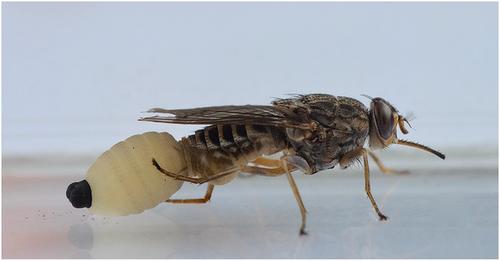
Credit: Daniel Hargrove
The female tsetse fly, which gives birth to adult-sized live young, produce weaker offspring as they get older, and when they feed on poor quality blood.
The study, carried out by researchers at the Universities of Bristol, Oxford and the Liverpool School of Tropical Medicine, was designed to measure how tsetse offspring health is influenced by their mothers’ age, and how factors such as the mother’s nutrition and mating experience might come into play.
In many animals, females show signs of reproductive ageing – where offspring health declines with maternal age – but there is huge variation within species in how rapidly this ageing occurs.
Scientists found that female tsetse that experience nutritional stress have lower fertility and produce smaller offspring that are less likely to survive starvation. However, the rate at which the female fly ages is not affected by the quality of her diet or how long she waited to mate. Thus, neither nutrition during pregnancy nor mating costs drive variation in reproductive ageing in this species.
Dr Sinead English of Bristol’s School of Biological Sciences and senior author of the paper said: “Tsetse are remarkable flies. Mothers can produce offspring the same size they are. But, like many other animals (including humans), this huge reproductive investment comes at a cost: as females get older or when they have low quality food, they produce weaker offspring which do not survive as long. We still do not know, however, why some females age more rapidly than others.”
Now researchers will look at new ways to test evolutionary predictions about ageing, using a new model system and innovative method of tracking reproduction of individual flies.
Dr English added: “We are also interested in understanding these patterns in tsetse as they spread deadly parasites, called trypanosomes, to humans and animals. By understanding how offspring survival depends on maternal nutritional stress and age, we can design better population dynamic and disease transmission models.
###
Paper:
‘Effects of maternal age and stress on offspring quality in a viviparous fly’ by Dr Jennifer Lord et al in Ecology Letters.
Media Contact
Laura Thomas
[email protected]




